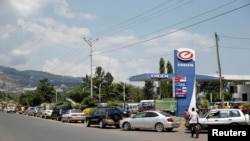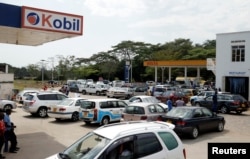Fuel shortages have paralyzed the small central African nation of Burundi, threatening further damage to an economy already moribund after years of political violence and raising questions about the role of the country's only oil importer.
The problem has damaged two big foreign investors, Kenya's KenolKobil and South Africa's Engen, a subsidiary of Malaysian parastatal Petronas.
The shortages, which forced the government to introduce rationing on May 16, have paralyzed commerce and caused food prices to jump by around a third, raising the prospect of a wave of economic migration. More than 400,000 people have already fled Burundi into the volatile central African region.
Anti-corruption campaigners said the fuel shortages became severe after Burundian company Interpetrol Trading Ltd. received the lions' share of dollars that are allocated by the central bank to import fuel.
"The oil sector is undermined by favoritism and lack of transparency, because the rare hard currency available in the central bank reserves is given to one oil importer," said Gabriel Rufyiri, head of anti-graft organization OLUCOME.
The central bank declined to answer Reuters' questions.
Interpetrol's lawyer, Sylvestre Banzubaze, said: "I am not associated with the day-to-day operations and only intervene on legal questions. You should address your questions directly to Interpetrol sources."
He did not respond when asked for further contacts, and the company does not have a website.
Rufyiri said that government sources told him that the bulk of dollars for fuel purchasing had been allocated to Interpetrol since March this year.
Reuters confirmed with two other sources that Interpetrol received the bulk of dollar allocations. Other companies only received a small fraction of the dollars they needed, the sources said, severely damaging their businesses.
Earlier this month, South African petrol company Engen confirmed it had sold its assets in Burundi to Interpetrol.
Engen declined to comment further. KenolKobil also declined to comment, but Burundian citizens say most of their petrol stations have been closed for three months.
Sole importer
Interpetrol is now the sole oil importer and runs all the fuel storage tanks in the country, said an industry source.
Banzubaze said there was "no link" between Interpetrol's shareholders and any member of the government.
But a 2011 U.S. State Department report described attempts by senior government officials to pressure judges into dropping a corruption case against the company, owned by brothers Munir and Tariq Bashir. Neither the government nor Interpetrol's lawyer responded when asked about the status of the case.
Government officials blame dollar shortages on aid cuts that donors imposed after President Pierre Nkurunziza ran for a third term in 2015, triggering a wave of political violence.
"These days, fuel importers don't get enough dollars to bring petroleum products," said Daniel Mpitabakana, the government's director of fuel management.
Burundi's economy shrank by 0.5 percent last year, and the International Monetary Fund expects no growth at all this year and 0.1 percent next year.
Black market prices for fuel range between 5,000 to 6,000 Burundi francs per liter, vendors said, double the official price of 2,200 francs.
The street exchange rate is 2,600 francs to the dollar, although it is just over 1,700 to the dollar at the central bank. Only the central bank can receive dollar deposits and allocate dollars to businesses.
In the capital, queues at empty petrol stations snaked around the block. One civil servant said he had taken the last three days off work to search for gas.
"I have no fuel for days and I don't know if by chance will get it today," he said, asking not to be named.
Burundi has also been battered by drought and almost two years of political instability. Hundreds of people were killed and hundreds of thousands were forced to flee abroad during the political violence, which still sometimes erupts in low-level clashes.
Almost 3 million of Burundi's 11 million citizens are dependent on food aid, the U.N. says.






